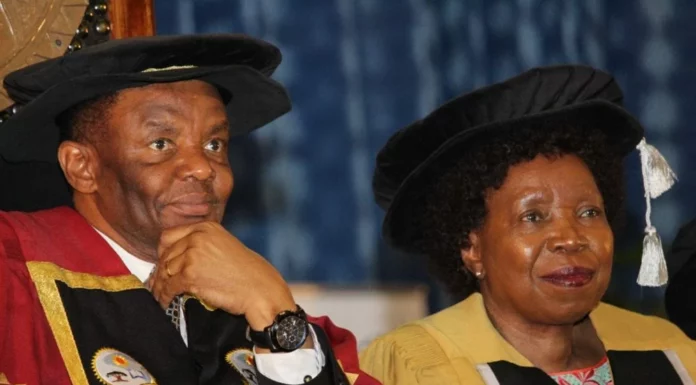This year as we celebrated our 60 years of existence as an institution we also installed Dr Nkosazana Clarice Dlamini-Zuma as the new chancellor.
She will serve the university for the next five years until 2024. Dr Dlamini-Zuma is the first female and second chancellor of University of Limpopo since its name change in 2005, taking over from Dr Reuel Khoza who has been at the helm for two terms between 2007 and 2017.
Dlamini-Zuma will be presiding over an institution with a rich history dating back 60 years ago.
On August 1, 1959, the University College of the North opened its doors as a result of the Extension of University Education Act of 1959, which made provision for the establishment of racially exclusive universities for black people.
The college was placed under the academic trusteeship of the University of South Africa. This formative relationship was maintained until parliament promulgated the University of the North Act, thus bringing to an end the college status as of January 1 1970.
This gave birth to the University of the North, until January 2005, when it was merged with the Medical University of Southern Africa, now Sefako Makgatho Health Sciences University to form the University of Limpopo.
Nine years after the merger, on May 26 2011, the minister of higher education and training, Dr Blade Nzimande, announced his intention to separate the two institutions. The decision was taken at the ANC’s national executive committee lekgotla in 2011.
As at January 2015, the University of Limpopo became a stand-alone institution with its own faculty of health sciences offering qualifications in medicine, nursing, human nutrition, optometry and medical sciences.
In line with the government’s plans to expand the country’s capacity to train sufficient doctors, the University of Limpopo opened the first medical school at the dawn of the democratic dispensation.
In 2017, the South African Institute of Chartered Accountants accredited the University of Limpopo to offer the Certificate in the Theory of Accountancy.
The CTA programme, which is also known as a postgraduate diploma in accountancy, was established to address the dire need for black chartered accountants in South Africa.
The accreditation will also assist students from disadvantaged backgrounds to qualify as chartered accountants.
A birthday triggers off a wave of self-introspection, where we take stock of the previous six decades to consider whether we realised certain milestones.
This year provides an appropriate platform for the university to reflect on whether the institution has responded to the developmental needs of our students, staff and communities through relevant and higher quality education and training, research and community engagement.
This year, we launched the new department of geology and mining, sponsored by mining company Ivanplats, with the aim of developing the geological sciences and boosting the country’s economy.
Further, the fourth industrial revolution has caught up with us. This challenges us to adapt to the new world order and requires that our research encourages the use of technology and innovation to sustain its relevance.
As a global player, our research explores diverse areas involving multidisciplinary, interdisciplinary, and transdisciplinary engagements.
Today, the University is a hive of activity providing access to higher education in a rural context to young, vibrant, aspirant future leaders. It has four faculties: health sciences, humanities, science and agriculture, and management and law, all servicing just more than 21 000 students.
The University of Limpopo believes in promoting access to education to female students and students living with disabilities. Today, it boasts a 53% female student population and state-of-the-art facilities to accommodate students living with various disabilities in the country.
As a global player, our research explores diverse areas
Sponsored content



